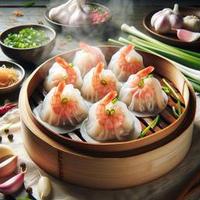
1 serving (100 grams) contains 200 calories, 10.0 grams of protein, 5.0 grams of fat, and 30.0 grams of carbohydrates.

Log this food in SnapCalorie

Nutrition Information
Calories |
476.2 | ||
|---|---|---|---|
% Daily Value* |
|||
| Total Fat | 11.9 g | 15% | |
| Saturated Fat | 2.4 g | 12% | |
| Polyunsaturated Fat | 0 g | ||
| Cholesterol | 119.0 mg | 39% | |
| Sodium | 952.4 mg | 41% | |
| Total Carbohydrates | 71.4 g | 25% | |
| Dietary Fiber | 2.4 g | 8% | |
| Sugars | 4.8 g | ||
| protein | 23.8 g | 47% | |
| Vitamin D | 0 mcg | 0% | |
| Calcium | 47.6 mg | 3% | |
| Iron | 2.4 mg | 13% | |
| Potassium | 238.1 mg | 5% | |
* Percent Daily Values are based on a 2,000 calorie diet. Your daily values may be higher or lower depending on your calorie needs.
Food Attributes
Source of Calories
About Prawn dumplings
Prawn dumplings, also known as har gow, are a beloved delicacy in Cantonese cuisine, often served as a staple in traditional dim sum. These delightful dumplings feature a translucent, chewy wrapper made from wheat starch and tapioca flour, encasing a juicy filling of chopped prawns, sometimes mixed with a hint of bamboo shoots, garlic, or ginger for extra flavor. Low in calories and high in protein from the prawns, they offer a lean source of nutrients. However, their sodium content can be high due to soy sauce or seasoning in the recipe, and the refined starch in the wrappers contributes limited nutritional value. Typically steamed, they are a healthier option compared to fried dim sum items. Prawn dumplings are best enjoyed in moderation as part of a balanced diet, offering a flavorful taste of authentic Chinese culinary tradition.



